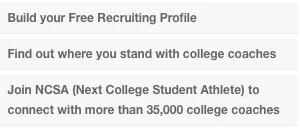New Concussion Lawsuit Wants NCAA Monitoring of High School Practices
Jon Solomon for the Birmingham News:
Alvin Jobe, on behalf of his son Grayson, identified as an 11th-grade football player at Central Holmes Christian School in Lexington, Miss., wants the NCAA and NFHS to provide high schools with current concussion-risk information and standard of care practices in their possession. He is also asking for both associations to certify that high schools have concussion management plans for preventable risks of head injuries.
The connection and responsibility of the National Federation of State High School Associations over high school football seems clear, although suing individual state high school associations might be necessary. But the NCAA’s role is less clear. There is a decent argument that the NCAA should be involved, but both the plaintiffs’ theory and proposed implementation seem flawed.
The plaintiffs argue that the NCAA should be involved with high school concussion management because the NCAA already certifies initial eligibility through the Eligibility Center. That leads naturally to the proposed enforcement of NCAA-mandated medical care standards: players from high schools who do not implement NCAA-certified medical care practices would not be eligible for college sports.
Messing with eligibility is a non-starter. The public will not accept a system where a player is deemed ineligible because, completely outside of the player’s control, their high school did not implement proper standards of care. Especially if the athlete is given a clean bill of health when starting their college career.
The better comparison which leads to the better enforcement mechanism is the NCAA’s certification of summer AAU tournaments. The NCAA already enforces health and safety standards in its basketball event certification guidelines:
(m) Qualified medical personnel must be present at the event;
…
(q) The event operator must provide proof of accident medical insurance coverage for event participants.
The carrot and stick for basketball event certification is that college coaches may not evaluate prospects at events which are not certified by the NCAA.
A similar system could be used for concussion management plans. The NCAA would publish requirements for high schools to have their plans certified. The NCAA staff would review plans and certify that they meet the guidelines and publish the list of high schools who have been certified. College coaches would only be able to have contact with prospects on a high school campus or perform any evaluation activities involving a high school team if the school has a certified concussion management plan.
The combination of recruiting restrictions and expulsion from the high school association should be enough to force almost all high schools in the country to fall in line, without involving the eligibility of prospects. Then the wave of concussion lawsuits can move on to an even larger and more unwieldy target: elite club teams.
Alvin Community College Sports Recruiting


